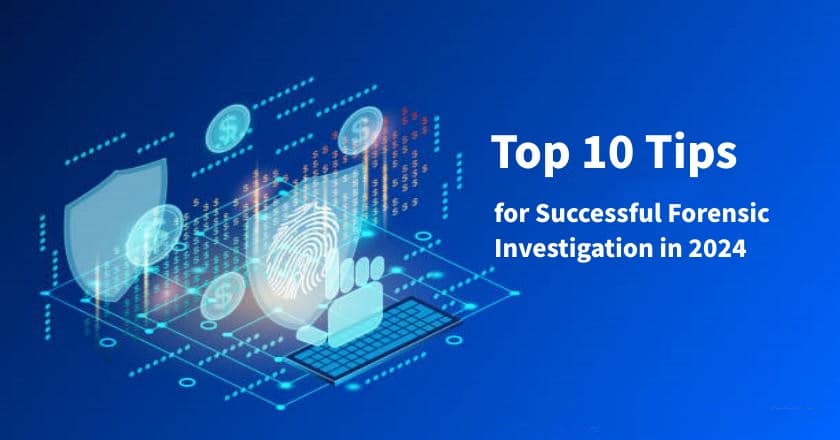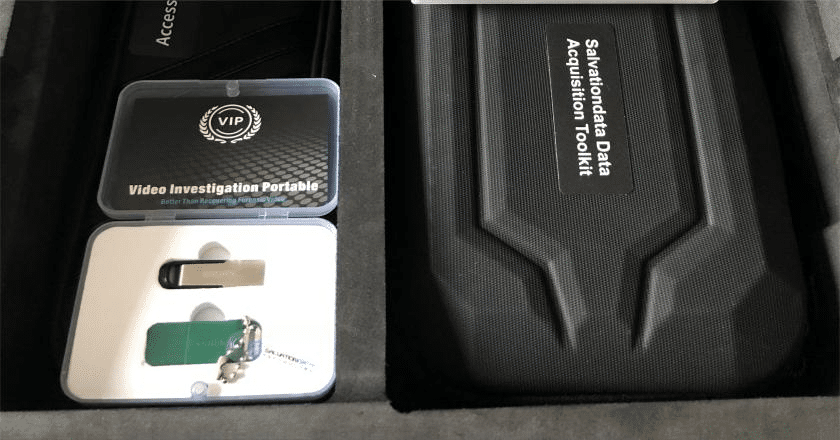What is forensic investigation? People working in this field look for evidence in digital environments through organized research. Given how quickly things change in this field, those who want to do well must stay on top of the fast progress in digital forensics. The latest ideas and tactics for forensic detectives are given in this piece to help them do their jobs better. Understanding and implementing the latest tools and techniques, including essential dfir tools, is pivotal for conducting successful forensic investigations. The process typically unfolds in several detailed steps, and knowing how many steps are involved in the forensic investigation process is crucial for ensuring thoroughness and legal compliance. Here are the ten best tips that will help you get through the complicated world of modern forensics and make sure that your method stays useful and effective in today’s fast-paced digital world.
Top 10 Tips for Successful Forensic Investigation in 2025

-
Content
- Tip 1. Stay Updated with the Latest Digital Forensic Tools
- Tip 2: Enhance Your Knowledge of Cybersecurity
- Tip 3: Master Data Acquisition and Preservation Techniques
- Tip 4: Develop Strong Analytical Skills
- Tip 5: Invest in Advanced Training and Certifications
- Tip 6: Collaborate with Cybersecurity Experts
- Tip 7: Keep Up with Legal and Ethical Standards
- Tip 8: Improve Communication Skills
- Tip 9: Focus on Detail and Accuracy
- Tip 10: Learn from Past Cases
- Conclusion
-
Content
- Tip 1. Stay Updated with the Latest Digital Forensic Tools
- Tip 2: Enhance Your Knowledge of Cybersecurity
- Tip 3: Master Data Acquisition and Preservation Techniques
- Tip 4: Develop Strong Analytical Skills
- Tip 5: Invest in Advanced Training and Certifications
- Tip 6: Collaborate with Cybersecurity Experts
- Tip 7: Keep Up with Legal and Ethical Standards
- Tip 8: Improve Communication Skills
- Tip 9: Focus on Detail and Accuracy
- Tip 10: Learn from Past Cases
- Conclusion
Tip 1. Stay Updated with the Latest Digital Forensic Tools
In the constantly changing field of forensic investigation, being able to respond to and use new tools can make your investigations much more effective. Here are some of the most important new digital forensic tools for 2024:
1. Mobile Forensic Tool: Cellebrite UFED
Cellebrite UFED, the mobile forensics tool, can get data off of phones and look at it in a way that no other tool can. It has advanced tools that can open encrypted files and get back messages that have been deleted, which is very useful in a digital search.
2. Database Forensic Tool: EnCase Forensic
EnCase Forensic is a database forensic tool that is made to quickly get data from difficult database systems. There is no difference between SQL, NoSQL, and other types of databases when this tool is used. It makes sure that all data is returned. This is important for doing a full investigative investigation.
3. File Carving Tool: Foremost
Foremost, File Carving Tool is very good at getting back lost or deleted files from digital storage. Its strong features let investigators get back data from empty disc space, which makes it an important digital forensics tool.
4. Computer Forensic Tool: Magnet Axiom
Magnet Axiom is a computer forensic tool that every forensic expert needs to have. It comes with a set of tools that make it easier to look into computer systems in depth and find information on device hard drives that is secret or hard to see. The wide range of features in Magnet Axiom makes it possible to fully scan and restore digital evidence, making sure that no detail is missed during forensic investigations.
5. Video Forensic Tool- VIP 2.0
Forensic experts can carefully look over and improve video clips with the video forensic tool- VIP 2.0. This tool is very important for situations where video evidence is very important because it lets you look at frames one by one and analyse information. Click to get a Forensic Download here!
Staying current with these tools is crucial for any forensic professional aiming to conduct effective and efficient forensic investigations.
Tip 2: Enhance Your Knowledge of Cybersecurity
It has never been more important to use privacy in forensic investigations. Cybersecurity plays a very important part in keeping digital proof safe and figuring out what it means as digital risks change.
1. Growing Significance of Cybersecurity in Digital Forensics
Understanding hacking is crucial for investigative techniques. As cyber risks evolve, protecting digital evidence and ensuring its admissibility in court becomes increasingly important.
2. Key Skills and Tools for Protecting and Analyzing Digital Evidence
To remain effective in the field, forensic investigators must master cybersecurity skills such as secure data handling, encryption, and the use of advanced analytical tools. Familiarity with cybersecurity frameworks and the latest security software ensures that digital evidence is scrutinized without compromise.
Tip 3: Master Data Acquisition and Preservation Techniques
The security of digital data is very important in forensic investigations. A lot of the time, the success of an investigation depends on how well digital evidence is collected and kept.
1. Importance of Maintaining the Integrity of Digital Data
Making sure that digital data stays valid is important for keeping proof in court. Any damage or change to the proof could make it less reliable, which could affect the result of a case.
2. Proper Techniques for Securing and Preserving Digital Evidence
Effective data acquisition and preservation techniques are critical for forensic investigators. Utilizing tools such as digital forensic tools and adhering to rigorous standards, like those defined in forensic investigation definitions, ensures that evidence is both secure and retrievable. Techniques include secure storage environments, maintaining clear custody chains, and using forensics software to create exact bitwise copies of data.
Tip 4: Develop Strong Analytical Skills
1. Critical Thinking and Problem-Solving in Digital Forensic Investigations
It is important to have good reasoning skills for forensic investigations because the way you think and solve problems can have a big impact on the outcome. Forensic experts can use these skills to simplify hard digital data, find patterns, and figure out how and why crimes happen online. To get to the truth in the digital world, it’s not enough to just follow the steps. For each case, you need to think outside the box.
2. Case Study Examples Highlighting Analytical Skill Application
Consider a case where enhanced analytical skills were crucial: A digital forensics investigator examined inconsistencies in file timestamps during a digital forensic investigation. By carefully looking at these differences, the investigator was able to find out where the harmful software came from, which had been cleverly hidden in normal operations.
Tip 5: Invest in Advanced Training and Certifications
1. Recommended Courses and Certifications for Digital Forensic Investigators
People who work in forensic investigations need to keep learning. Getting qualified and taking advanced training classes are great ways for professionals to boost their skills and image. Certified Digital Forensics Investigator (CDFI) and Certified Information Systems Security Professional (CISSP) are two well-known certifications in the field. Digital forensics courses that focus on tools and the meaning of a forensic investigation definition not only help students learn more, but they also help detectives adapt to the changing needs of digital forensics.
2. Benefits of Specialized Training in Areas Like Malware Analysis and Network Forensics
Professionals who get specialized training in areas like malware analysis and network forensics are better able to deal with certain cybersecurity problems. This training is very helpful because it gives them the skills to deal with and understand complex dangers, which makes their jobs as digital forensic investigators more effective.
Tip 6: Collaborate with Cybersecurity Experts
1. Importance of Interdisciplinary Collaboration with IT and Cybersecurity Professionals
It is not only helpful, but also important in the complicated world of forensic research to work with people from other fields. When IT and hacking experts are involved, digital forensic investigations can go much deeper and more completely. It uses this way to bring together experts from various areas to cover all technical aspects, such as keeping networks safe and working out how complex data breaches happened.
2. Building a Network of Experts for Comprehensive Investigations
Building a network of skilled workers makes it easier to do thorough investigations. When detectives work with experts in digital forensics, forensic video investigation, and network security, they can get a wide range of ideas and information. This network speeds up investigations and makes sure that the results are accurate and reliable.
Tip 7: Keep Up with Legal and Ethical Standards
1. Understanding Legal Implications and Ethical Considerations in Digital Forensics
An important thing for forensic investigators to always keep in mind is the legal and moral issues that come up. Digital proof is becoming more and more important in court cases, so the ways that it is collected and analysed must strictly follow legal and moral rules. This strictness protects people’s rights and makes sure that the proof can stand up to court review.
2. Staying Informed About Changes in Digital Forensic Laws and Regulations
The laws and rules that apply to digital forensics are always changing. It is important for forensic workers to stay up to date on these changes so that their work stays in line with the new laws. Training and changes on these rules on a regular basis help keep the standards of the forensic investigation field high and protect the purity of the investigation process.
Tip 8: Improve Communication Skills
1. Importance of Clear and Concise Reporting in Forensic Investigation
A key part of a good forensic study is being able to talk to people clearly. Reporting that is clear and to the point makes sure that everyone can understands complicated technical details, even the legal and police teams.
2. Effective Communication with Law Enforcement, Legal Teams, and Stakeholders
Talking clearly to cops, judges, and other important people will help you get better at talking to people. It’s important to be able to clearly and thoroughly explain results to make sure that the evidence has the effect that was wanted. This is true whether you’re talking about the effects of digital evidence or the methods used in digital forensic cases.
Tip 9: Focus on Detail and Accuracy
1. Attention to Detail in Evidence Collection and Analysis
Paying close attention to details is very important in forensic investigations. Carefully gathering and analyzing proof is a must for making sure the investigation is fair. This means keeping a strict chain of custody for digital proof and carefully writing down every step that is taken. If forensic agents pay attention to these little things, they can be sure they don’t miss anything that could hurt their evidence or the outcome of their cases.
2. Strategies for Ensuring Accuracy and Reliability in Digital Forensic Work
In digital forensic work, it is important to use tools and methods that have been used before to make sure it is done right. Forensics tools are used to get digital proof, keep it safe, and look at it. It is important to follow best practices in digital forensic research. To keep up with changes in technology, these methods should be looked at and changed often. This will make investigative results more accurate and reliable.
Tip 10: Learn from Past Cases
1. Reviewing and Analyzing Past Digital Forensic Investigations
Going over and thinking about old cases is one of the best ways to get better at forensic research. This study of the past not only helps people understand the different methods that were used, but it also shows which plans worked and which ones didn’t.
2. Lessons Learned from High-Profile Cybercrime Cases
Cases of cybercrime that get a lot of attention can teach us important lessons that can change the way we investigate in the future. Unfortunately, these cases show important holes in security and the ways hackers get around them. This gives us useful information for improving our defences. Because investigative experts have learned from these mistakes, they will be able to spot and stop threats like these in the future.
Conclusion
Forensic investigation is an area that changes very quickly, so staying on top of new technology and methods is very important. This article has given digital forensic experts ten important tips that are a mix of technical know-how and strategy understanding. Each of these tips is meant to make them more effective. These rules cover everything you need to know to be successful in 2024, from learning how to use the newest digital investigative tools to improving your conversation skills and following the law. Also, the fact that the field is always changing is shown by how important it is to keep learning, whether that’s through advanced training or looking at old cases. As digital worlds get more complicated, these tips will help forensic detectives deal with problems more accurately and with more trust. This will make sure that their contributions to digital justice are significant and can’t be argued with.






